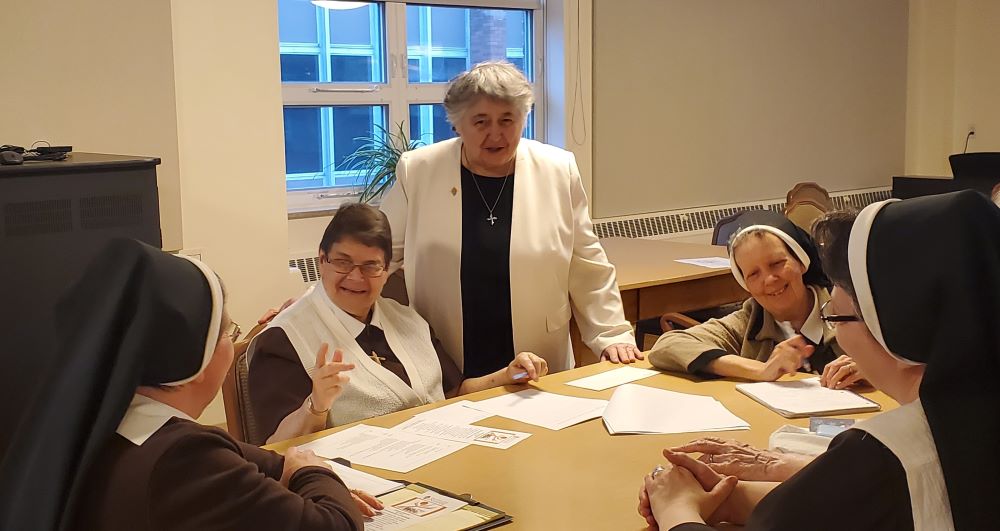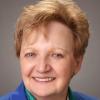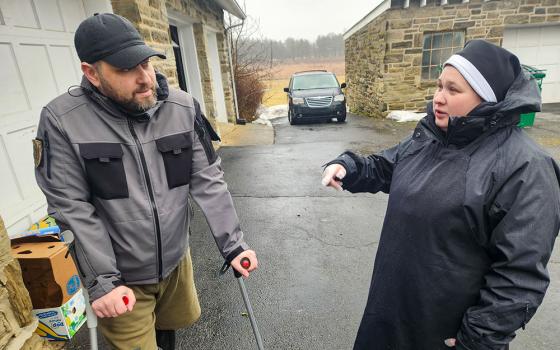
Dominican Sr. Patricia Wormann (in white jacket), delegate for religious for the Archdiocese of Newark, New Jersey facilitates a synod listening session with the Felician Sisters of Lodi, New Jersey. (Courtesy of Donna Ciangio)
Over the centuries, men and women religious have practiced synodality through chapters, community meetings, and conversation groups to prepare for chapters of elections and affairs, house meetings and more. Decisions are made through prayer, dialogue (sometimes intense), and contemplative discernment to come to a decision or a way forward.
The synod handbook, or vademecum, states that "Synodal listening is oriented towards discernment. It requires us to learn and exercise the art of personal and communal discernment." As religious, we know that synodality and discernment is a way of life. The congregation engaged in synodal processes plan for the common good. That may mean exploration of new ministries, letting go of current ministries, redefining formation, planning for retirement of elders, and responding to the needs of the church now and in the future. The charism and rule of each institute creates the environment for both synodality and discernment to take place.
The experience of religious can be a great help to parishes and ministry groups holding listening sessions. The synod on synodality documents suggested that religious also participate with parishes and groups and that both are enhanced when religious are a part of the process. Building a sense of mutual respect and communal spirit in small groups can be a huge benefit. Taking a quiet prayer break to listen to the Holy Spirit in the middle of discussion enhances the seriousness of the synodal process.
My congregation, along with our associates, held a listening session for the entire community. The session was on Zoom and worked very well. We prayed together, used breakout rooms for the dialogue and took quiet time for prayer and synthesis of the discussions. It was a more disciplined process on Zoom than in person, but it went smoothly and there was excellent feedback. Many of the sisters and associates also participated in parish and other group listening sessions.
Advertisement
Religious in my area were informed early on about the synod through their annual meeting of major superiors and bishops of the state. Many held regional listening sessions in their congregations as well as regional meetings with various congregations coming together to get to know each other, pray and dialogue, and find commonalities in life, ministry and desires for our Church. Many participated in their local parishes, and again, their experience and wisdom enhanced the conversations.
When we began preparing for the synod process in my archdiocese, the song by Carey Landry, "The Spirit Is A-Movin' " kept coming to me. Pope Francis asked: "What is the Spirit asking of the Church of the 21st Century?" He went on to say: "It is precisely this path of synodality which God expects of the Church of the third millennium." His experience as a Jesuit certainly influenced him to take on this global consultation. He wants to hear the lived experience of the faithful from far and wide and their discernment of what the Holy Spirit is calling for. It is a remarkable undertaking for the Vatican Synod office and the dioceses of the world, as well as many other organizations in the church.
The contributions of religious to this process are invaluable. The three synod concepts of communion, participation and mission are the common elements of religious life. They are constantly in process in each congregation and "house" where religious live. They are both conscious and unconscious realities of religious life, almost like breathing.
We all pray that this global consultation will bear fruit on the universal level of the church as well as the local level. This is the time, like no other, to continue contemplative listening. Religious can be the key to this as they call the faithful to dialogue with them in community as well as in parishes and particular ministries. As the vademecum expresses, "synodality represents the path by which the Church can be renewed by the action of the Holy Spirit, listening together to what God has to say to his people."
A lot of work by many people went into producing materials to be used by all the different types of groups in the diocese. Our desire was to reach every parish and train them to do listening sessions organized by the parish pastoral councils. In total, we held about 24 information sessions in parishes, deaneries, ministry or at organization meetings to familiarize people with the process.
In addition to parish events, we gathered our diocesan pastoral ministries to develop resources that would fit their constituents: catechetics, schools, evangelization, youth, young adults, people with disabilities (which was featured in the Vatican Media newsletter) and more. We reached out to organizations working with people on the peripheries, like Catholic Charities, Mercy House, religious communities, food pantries, nursing homes, homeless, and LGBTQ communities. In a large diocese, we also made sure that we had resources in languages such as Polish, Portuguese, Korean, some Chinese and French. Our Hispanic Ministry Office prepared five sessions Encuentro style to engage people in the process.
Having worked for many years in a parish and as a consultant to parishes and dioceses, I have found that many of those on the margins are right in our own parishes. They are disenfranchised Catholics as well as parents of kids in religious education, youth, young adults, those in college or already working in the marketplace. You don't have to go far to find Catholics who are no longer engaged or do not want to be part of the church.
Parish leadership reached out to parishioners to join synod listening sessions. Many parishes hosted six-plus sessions, inviting all to come. What I heard is that parishes were concerned about people not participating, including young adults and youth and those who have not returned because of the pandemic, a need for strong faith formation for children as well as adults, and ways to create the environment for an encounter with Christ. All of these issues are contributing to anxiety at the parish level. On the other hand, there was great excitement about being asked by Pope Francis to gather together to pray, dialogue and discern what the Holy Spirit is asking of the church of the 21st century. It took some explanation and examples for people to think on that global level. Catholics are not used to being asked such questions, so we helped them to move from local concerns to the universal level.
Early feedback indicates that people are eager to see more women in key leadership roles in parishes and ordained liturgical ministries, better outreach to youth, and reinvesting in Catholic schools and faith formation for youth and adults. They also want to change negative perceptions of the church as insular and out of touch. Other concerns include facing the sex abuse crisis, the need to welcome all people (including a focus on LGBTQ people), optional celibacy for priests, and enhancing the roles of religious brothers, sisters and permanent deacons in spiritual and sacramental ministries.
This all makes for a rich mosaic of the myriad of groups that we are blessed with throughout the Archdiocese of Newark, New Jersey. Our synod report is here: you can see the Spirit IS a-movin' in our archdiocese and, indeed, throughout the land! We need to listen and move forward.





